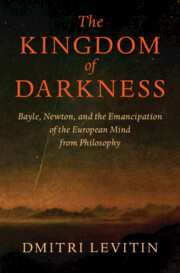Book contents
- The Kingdom of Darkness
- The Kingdom of Darkness
- Copyright page
- Contents
- Preface
- Abbreviations and Conventions
- General Prologue
- Part I Giving Up Philosophy
- Part II Pierre Bayle and the Emancipation of Religion from Philosophy
- Part III Isaac Newton and the Emancipation of Natural Philosophy from Metaphysics
- III Prolegomena
- III.1 After the Principia
- III.2 The Queries to the Optice (1706)
- III.3 The General Scholium
- III.4 Newton’s Kingdom of Darkness Complete
- Part IV The European System of Knowledge, c.1700 and Beyond
- Bibliography
- Index
III.1 - After the Principia
Justifying a Science of Properties and the Invention of ‘Newtonianism’
from Part III - Isaac Newton and the Emancipation of Natural Philosophy from Metaphysics
Published online by Cambridge University Press: 23 March 2022
- The Kingdom of Darkness
- The Kingdom of Darkness
- Copyright page
- Contents
- Preface
- Abbreviations and Conventions
- General Prologue
- Part I Giving Up Philosophy
- Part II Pierre Bayle and the Emancipation of Religion from Philosophy
- Part III Isaac Newton and the Emancipation of Natural Philosophy from Metaphysics
- III Prolegomena
- III.1 After the Principia
- III.2 The Queries to the Optice (1706)
- III.3 The General Scholium
- III.4 Newton’s Kingdom of Darkness Complete
- Part IV The European System of Knowledge, c.1700 and Beyond
- Bibliography
- Index
Summary
This chapter explores the development of Newton’s methodological thought up to c.1700, as well as that of his first followers. Newton’s caution in not antagonising Huygens in particular is highlighted. It was only in this decade that Newton started to emphasise the natural-theological significance of his natural philosophy, especially in manuscripts related to the Classical Scholia. But there was no metaphysical component; rather, Newton insisted on the analogical predication of the divine. Even more important was his reconsideration of the Hypotheses of the first edition, which eventually became the Rules of Philosophising of the second. It is shown that these were not abstract methodological principles, but rather a set of dialectical arguments designed to negate the possibility of weightless matter. Nonetheless, they shaped Newton methodological agenda and language for the rest of his life. His position was understood perfectly by his earliest follows: David Gregory and John Keill, both of whom were teaching in Oxford.
- Type
- Chapter
- Information
- The Kingdom of DarknessBayle, Newton, and the Emancipation of the European Mind from Philosophy, pp. 577 - 652Publisher: Cambridge University PressPrint publication year: 2022

